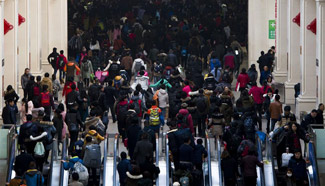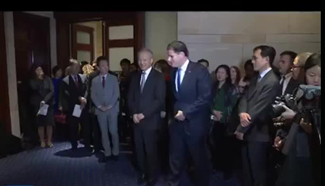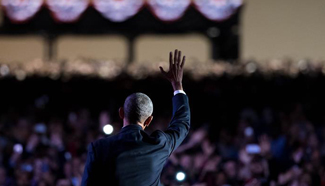by Qu Junya
BEIJING, Jan. 13 (Xinhua) -- A new page in U.S.-China relations is set to open with a shift in White House occupancy a week away. Changes are expected on both sides of the world's most important bilateral relationship.
Let's hope those changes are for the better. A stronger bilateral relationship raises the confidence needed for tackling global challenges, including terrorism and a stubborn wave of anti-globalization, the rise of which the U.S. is partly to blame.
In an article published Thursday in China's official newspaper the People's Daily, outgoing U.S. ambassador to China Max Baucus said that Washington's support for the rise of a stable, peaceful and prosperous China has been ongoing for decades, a policy maintained by both Democratic and Republican administrations.
In the article, Baucus voiced hope for the incoming Donald Trump administration to continue economic and trade cooperation with China under multilateral trade rules.
In his capacity as a U.S. Senator, Baucus said he played a role in China's accession to the World Trade Organization, because he knew it would not only benefit China but also the United States and the world as a whole. He was right.
The U.S.-China economic relationship today supports some 2.6 million jobs in the United States, a U.S.-China Business Council report said Tuesday. And in 2015, China was the third largest buyer of U.S.-made products and services worth 165 billion U.S. dollars, behind only the bordering countries of Mexico and Canada.
As a powerful engine of global trade, China now boasts a gross domestic product accounting for over 15 percent of the world's total. Furthermore, the country is now capable of assuming a leadership role in solving economic difficulties worldwide.
Vowing to bring jobs back to America, Trump's worries about the state of the U.S. economy could see respite through expanded ties with China rather than through protectionism.
Chinese entrepreneur Jack Ma's pledge for creating one million jobs in the United States is a step in the right direction. Recently, during a 40-minute chat with Trump, Ma discussed his ideas for raising employment through e-commerce to help one million U.S. small- and medium-sized enterprises, especially those in the Midwest.
It also highlights the deep interdependance between the two economies.
Baucus said in his farewell message that both China and the United States have greatly benefited from their relationship. He cited U.S.-China cooperation in reaching the Paris deal on climate change, China's contribution in the fight against the Ebola epidemic in Africa, as well as China's role in the six-party talks on denuclearizing the Korean Peninsula.
As an important bridge to help Washington and Beijing better understand each other, the U.S. ambassadorship in Beijing is a key post that garners plenty of attention and high expectation. Trump's pick of Iowa Governor Terry Branstad may be a sign of goodwill. Branstad is an old friend of the Chinese people, and Beijing has expressed its welcome.
It is also Baucus's hope that Washington and Beijing will control their differences in a constructive way, something he witnessed firsthand during meetings between U.S. President Barack Obama and Chinese President Xi Jinping.
Beijing expects no less in the relationship, one that is healthy and stable and defined by win-win cooperation for all. Let ties between China and the U.S. move forward in good sense. The world, after all, depends on it.














